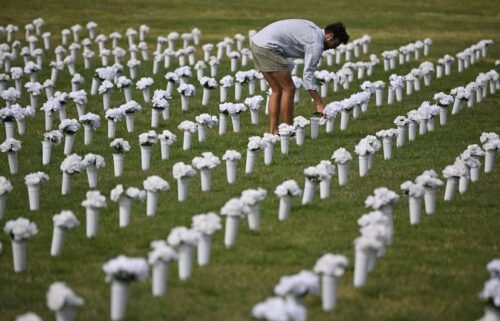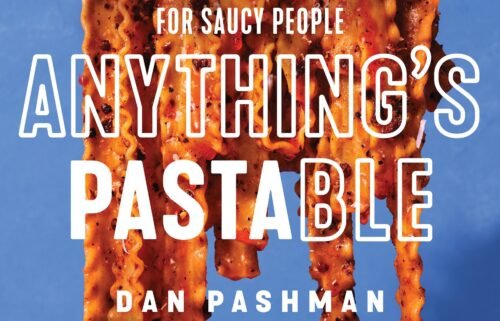Americans’ trust in science declining, Pew survey says
(CNN) — Americans’ trust in science and scientists has dropped since the start of the Covid-19 pandemic, according to a new report by Pew Research Center.
The percent of American adults who say science has a “mostly positive” effect on society fell to 57%, down 8 percentage points since November 2021 and 16 percentage points since just before the pandemic, according to the survey of more than 8,800 U.S. adults conducted in the last week of September.
More than a third of respondents believed that the impact of science has been equally positive and negative, while 8% think science has a “mostly negative” impact on society.
Trust in science wasn’t the same across the political spectrum: The Pew survey found that Republicans had less confidence in scientists and the benefits of science than Democrats. Less than half of Republicans (47%) said science has had a mostly positive effect on society, a decline from 70% in 2019. Sixty-nine percent of Democrats say science has had a mostly positive effect on society, although that has also declined by 8 points from 2019.
“If you look at the data in detail, it’s really kind of an information divide,” said Dr. Katrine Wallace, an epidemiologist and anti-misinformation advocate at the University of Illinois Chicago who was not involved in the report. “There’s been a kind of a monotonic decrease since 2019 in trust in science. It’s kind of stunning.”
‘Chaos, bewilderment, message fatigue’
Despite public opinion turning away from science, nearly three-quarters of U.S. adults expressed confidence in scientists to act in the public’s best interest. More Americans had at least some faith in scientists to act in the public’s best interest than other prominent groups, such as business leaders, religious leaders, journalists and elected officials.
But trust in scientists is lower than at the start of the pandemic, with over 1 in 4 Americans (27%) saying they have “not too much” or “no confidence” in scientists. The proportion of respondents who had the strongest trust in scientists — saying they have a “great deal of confidence” — fell to 23% from 39% in 2020.
According to Brian Kennedy, an author of the report and a senior researcher at Pew, that wasn’t always the case. From 2016 until the start of the pandemic, he noticed a general increase in trust toward scientists — followed by a sharp decline once the pandemic began.
Wallace attributes the rise of scientific mistrust to what she described as an “infodemic” about Covid-19: an influx of conflicting information and opinions about the virus and prevention measures.
“It led to a lot of public chaos, bewilderment, message fatigue and people just kind of checking out,” Wallace told CNN. “It just causes a lot of confusion because we have different people with big platforms saying different things.”
On social media platforms where public health messaging was shared, Wallace said, algorithms funneled users into informational “echo chambers” that showed them information with which they were inclined to agree.
In the absence of high-quality information about the Covid-19 virus, “information voids” for public health topics filled social media platforms with speculation, supplements and untested cures, she added.
In Wallace’s eyes, the system amplified disinformation and cultivated growing scientific mistrust among groups.
“Everyone was at home on social media and interacting in these echo chambers filtering out any information they didn’t want to see,” Wallace said. “Different groups come to different conclusions because they’re interacting with different information.”
And often, experts say, that flood of false information was intentional and malicious — attacking scientific voices in favor of inaccurate content.
Dr. Peter Hotez, the dean of the National School of Tropical Medicine at Baylor College of Medicine, said a “revisionist history” popped up as the pandemic emerged, blaming scientists for seeding mistrust and exacerbating the harms of Covid-19.
“There was a predatory, targeted, deliberate movement from the far right trying to discredit science and scientists,” Hotez said. “The narrative that’s trying to be put out there is that the scientists did something wrong.”
Partisan trust gaps
The Pew report found that mistrust in scientists varied widely depending on political party.
Nearly 40% of Republicans said that they had little or no confidence in scientists to act in the public’s best interest — up from the 14% of Republicans who held that belief in April 2020 or at the start of the pandemic.
Likewise, less than half of Republicans believe that science has a “mostly positive” effect on society, down from 70% in 2019.
Confidence in scientists also dipped among Democratic respondents: The share of Democrats with a “great deal” of confidence in scientists has dropped to 37%, down from a record high of 55% in November 2020.
However, over 8 in 10 Democrats still expressed “at least a fair amount” of confidence in scientists to act in the public’s best interest. Similarly, nearly 70% of Democrats continue to believe that science has a “mostly positive” effect on society.
The trust gap between Democrats and Republicans, Pew’s Kennedy said, already existed before 2020. But since then, it has widened.
For Republicans, trust in science decreased within the first few months of the pandemic. Among Democrats, strong trust in science increased to all-time highs during the early periods of the pandemic but has decreased in the years since.
“The pandemic … really lit a fire because everything became so politically charged,” Wallace said. “The whole concept of the lockdown and people being forced into their homes and their liberty being taken away — different mindsets about how to deal with the pandemic just became so politicized.”
Education levels also split respondents’ perspectives toward scientists: 80% of college graduates had at least a “fair amount” of confidence in scientists compared with 69% of those with some or no college education.
“The people that aren’t trusting science maybe just don’t understand it,” Wallace said. “It’s easier for those people to believe narratives because Covid science is not easy.”
Shared beliefs in scientific investment
While public trust toward science and scientists has fallen, 78% of Americans still believe government investments in scientific research to be “worthwhile,” with broad support for research investment from both Democrats and Republicans.
Over half of Americans consider it “very important” for the United States to be a world leader in scientific achievements, the report added. Men, older Americans, and those with more education were the most likely to value American dominance in scientific achievement.
Hotez said the scientific community can make some changes that will build trust.
“We need to up our game in terms of how we do science communication,” he said. “Stop with the old-fashioned idea of communication that we talk to the American people as if they’re in the sixth grade. Talk to them like adults.”
Universities, which Hotez believes are risk-averse, should encourage their scientists to speak out, he said.
But that’s only part of the problem, he said.
More importantly, to build trust, Hotez and other experts think a larger campaign against scientific misinformation is needed to counter “very aggressive” anti-science voices.
“There were a lot of voices talking about science that weren’t science voices,” Wallace said of the pandemic. “We see the misinformation being posted … and it’s just getting worse.”
The-CNN-Wire
™ & © 2023 Cable News Network, Inc., a Warner Bros. Discovery Company. All rights reserved.



